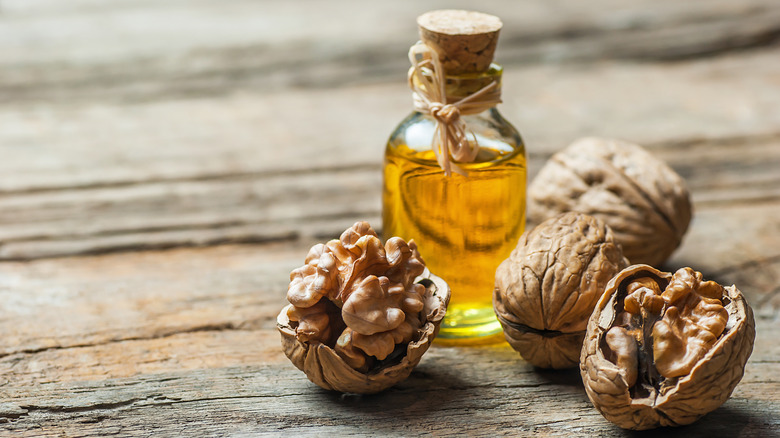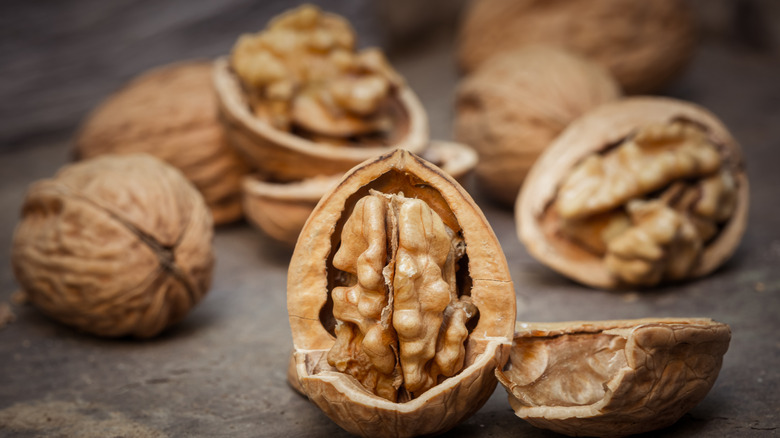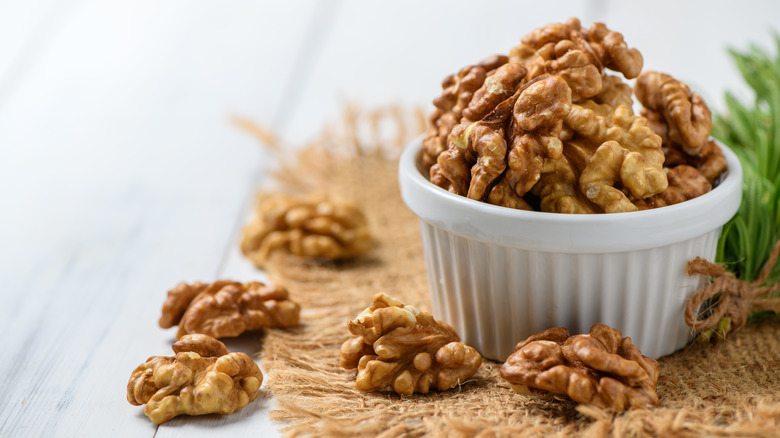What Is Walnut Oil And Is It Good For Cooking?
Anyone that has ever cooked knows it's fairly standard practice to use oil in recipes and other culinary preparations. While olive and vegetable oils are among the most commonly used, there is a wide range of options available sourced from a variety of items including nuts. Since nuts contain high quantities of fats, they can be pressed to release their natural oils and then bottled. Walnut oil is a prime example and its history actually dates back to the Romans, according to Slow Food Foundation. The website indicates that recipes mentioning walnut oil can be found in Switzerland dating back to the 16th century, even though you may be just hearing about it now.
Although it isn't ideal for cooking with heat, walnut oil has its own set of properties that make it most suited as a condiment or finishing touch. Depending on the style or brand you choose, flavors may be subtle and delicate or nutty and more pronounced. That means this unique nut oil can be used in sweet and savory dishes, and it even has a number of non-comestible uses, too.
What is walnut oil?
Walnut oil is of course made from walnuts, which grow on a tree that is part of the Juglandaceae family, according to Britannica. The most common variety used to make the oil is the Persian walnut (Juglans regia), which can be found in New Zealand, Australia, California, and France (via Delishably). Traditionally, walnut oil originates from the French Rhone-Alps and Switzerland since it was once more affordable than making butter in these regions, Slow Food Foundation explains. However, the source notes that, after World War II, butter became simpler and cheaper to make and, in turn, local walnut oil production greatly decreased.
Nowadays, Switzerland and France maintain some of their oil production, however, an analysis by Persistence Market Research suggests that North America currently leads the way for largest producer. Due to the higher average cost of walnut oil, the report also indicates that it is less popular in regions with lower incomes. Depending on the level of refinement and whether the walnuts are toasted prior to pressing, the oil can be pale beige, yellow, or slightly darker in tone and color.
How is walnut oil made?
Depending on the quality of the final product, walnut oil can be made in a few different ways. Essentially, Fine Cooking explains that walnuts are crushed into a paste which is separated into an oil and the remaining solids. Even though walnuts are high in fat, you'll still need five pounds of nuts to make one liter of oil, according to Cook's Info. This explains some of the higher costs associated with procuring walnut oil.
Originally in the Middle Ages and still today, Slow Food Foundation notes that walnut oil was and can be cold- or hot-pressed. In general, the cold style of making it preserves more of the flavor and nutrients whereas heat tends to destroy some of these elements.
The Epicentre also says that, to add a distinctive nuttiness, walnuts should be toasted prior to pressing them to make the oil. The source points out that over-filtering the oil results in a product lacking flavor and other interesting and defining qualities. Some producers take an even greater shortcut by allowing walnuts to soak in a neutral vegetable oil, in the hopes that some of the flavor is imparted, according to The Spruce Eats. If you're looking for the real deal, keep in mind that you'll have to shell out a bit more cash to obtain a high-quality walnut oil.
What does walnut oil taste like?
Since walnut oil can be made a few different ways, there are also some variations in the flavor. According to Healthline, cold-pressed, unrefined oil is the best quality available, with the flavor to match. It is light, delicate, and has a subtle nutty flavor reminiscent of the walnuts used to make it. Refined walnut oil on the other hand has been heated and processed to a greater extent, breaking down the nutrients as well as the flavor, says the article. The neutral flavor and higher smoke point of refined walnut oil make it more suitable for light sauteéing.
Meanwhile, The Epicentre suggests that toasting the walnuts before pressing them is indispensable for their rich nutty taste. Much like olive oil, the process with walnuts consists of multiple presses to obtain all of the oil. Again as with olives, Fine Cooking indicates that the first press is considered more aromatic and higher quality, so be sure to read the labels when purchasing walnut oil.
Delishably cautions against heating unrefined walnut oil or else they caution it may start to develop a bitter flavor. Stick to using unrefined styles only as a finishing touch for dishes and opting for refined oil if you plan to cook with it. You'll know when your walnut oil is no longer good if it starts smelling rancid, and you're best off storing it in the refrigerator for a longer shelf-life.
How to cook with walnut oil
Walnut oil's low smoke point doesn't make it a suitable choice for use when you are going to be cooking at high temperatures, since the flavor becomes bitter when too much heat is added to the equation. However, if you want to use it when cooking at low heat, opt for a refined version since it has a higher smoke point. Just keep in mind that the taste won't be as interesting as unrefined versions. If you're looking for an option with more flavor and aroma, be sure to choose cold-pressed unrefined oil, ideally seeking out the first press when possible (this will be noted on the bottle).
Thanks to its nutty and subtly sweet delicate flavor, the great thing about walnut oil is that it can be used in sweet or savory dishes. Cook's Info recommends incorporating it into baked goods or using it in traditional French cuisine. For a sophisticated addition to a cheese platter, drizzle some walnut oil over aged cheese. Richer styles are delicious when paired with classic vanilla ice cream or other desserts. Delishably provides other simple ideas for using walnut oil, such as adding it to a salad dressing or mixing it into a cream sauce to cook meat. Keep in mind that it is mostly used as a finishing touch so don't be shy about completing a plate of cooked vegetables or pasta with some of the nut oil drizzled on top.
Aside from consuming it, walnut oil makes an excellent food-safe varnish for wooden bowls and other wooden items, too, says The Spruce Eats.
Where to buy walnut oil
Walnut oil isn't quite as ubiquitous as olive or other vegetable oils, but it is still sold in a range of places. If you're shopping in a large supermarket, you can usually find it together with other oils or in the health food aisle. Alternatively, if you have access to gourmet specialty food shops, the source remarks you should have a good chance of coming across walnut oil in these places.
You'll notice that it tends to come in smaller bottles compared to other cooking oils since it isn't used as liberally. Depending on the specifications and quality of the product, the price can vary significantly but it is usually more expensive than olive oil.
If you're finding it tricky to source, there's always the internet when it comes to buying less common food items. Although, once you open it, Delishably advises to keep it refrigerated to prevent rancidity. The site adds that a cool, dark pantry is the next best option, but you'll want to get through the bottle within six to 12 months for best use.
Nutritional information about walnut oil
Plenty of research has been done about walnuts, but less so with regards to walnut oil. Therefore, some of its suggested benefits are theorized based on the health properties of walnuts. Interestingly, What's Cooking America indicates that 35 grams of walnut oil has the same nutritional benefit as 50 grams of walnuts, suggesting that more elements are extracted in the process.
Walnut oil is especially praised for its omega-3 polyunsaturated fat content, according to Healthline. In fact, the only macronutrient contained in walnut oil is fat, and VeryWellFit indicates that one tablespoon consists of 14 grams and 120 calories. Healthline notes that, in particular, walnuts contain alpha-linolenic acid, which may be especially beneficial in decreasing cholesterol levels. Similarly, lower blood pressure is another possible benefit to consuming walnut oil, according to Healthline. Altogether, these effects assist with healthy heart functioning, which could make walnut oil a beneficial addition to your diet.
This type of oil also has a high level of antioxidants, which Healthline reports may help reduce inflammation and the appearance of cancer-causing agents in the body. A number of vitamins and minerals are also present in the oil, including vitamins B, E, and C, as well as niacin, selenium, zinc, phosphorus, magnesium, calcium, and iron, according to What's Cooking America.
Keep in mind that if you are allergic to walnuts or other nuts, the oil is likely not a suitable option for you. However, VeryWellFit remarks that some highly refined versions contain no allergenic properties due to the processing. Nevertheless, you're probably better off not risking it.






